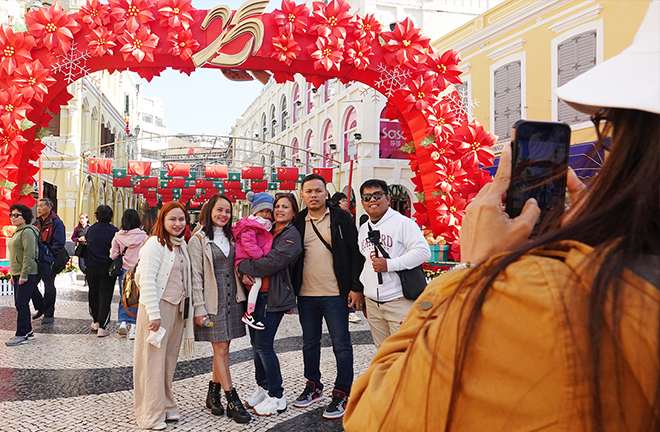


Distinctive policy contributes to Macao’s achievements 25 years on

Tourists pose for photos at the Senado Square in Macao on Dec. 21, 2024. Photo: IC PHOTO
On Dec. 20, 2024, the Macao Special Administrative Region (MSAR) marked the 25th anniversary of its return to the motherland. Over the past 25 years, the “one country, two systems” policy with Macao characteristics has been a resounding success, ushering in transformative changes and boosting the region’s international clout.
Remarkable achievements
Since Macao’s return in 1999, the “one country, two systems” framework has been continuously refined, guiding the MSAR toward phenomenal economic and social development, and significantly enhancing residents’ sense of fulfillment, happiness, and security.
In 2023, the median monthly income of Macao’s workforce soared to 17,500 Macao patacas (MOP) from less than 5,000 MOP in the early days following its return, while per capita GDP exceeded 559,000 MOP, per capita savings grew to over 1 million MOP, and per capita housing area expanded to larger than 20 square meters. In 2024, the Forbes magazine ranked Macao as the second wealthiest region globally and the richest in Asia.
The MSAR has also implemented 15 years of free education, covering kindergarten through high school, offering some of the most comprehensive educational benefits in Asia. Additionally, Macao has built stable economic, trade, and cultural ties with over 120 countries and regions, joined more than 190 international organizations, and secured visa-free or visa-on-arrival access to 147 countries and regions.
Commenting on the achievements of Macao, Wu Zhiliang, president of the Board of Directors of the Macao Foundation, told CSST that compared with 1999, the economic aggregate of Macao in 2019 grew 3.94 times in real terms, the cumulative aggregate by the third quarter of 2024 was 2.53 times that of 1999, and the overall unemployment rate dropped from a peak of 7.1% in the second quarter of 2000 to 1.7% at present. Public finance has also improved considerably, while residents’ living standards and quality of life have steadily risen, composing a magnificent chapter in the successful implementation of the “one country, two systems” policy with Macao characteristics.
Economic prosperity, social stability, outstanding achievements, and remarkable success were the four phrases used by Zhi Zhenfeng, director of the research center for law of Taiwan, Hong Kong, and Macao at CASS and a research fellow from CASS’s Institute of Law, to describe Macao at the 25th anniversary of its return. He stated that the MSAR has comprehensively and accurately implemented the “one country, two systems” policy, effectively safeguarding the constitutional order established by both the Constitution and the Macao Basic Law. In addition to adhering to the principle of “patriots governing Macao,” the MSAR has embraced leapfrog economic development, social harmony and stability, and an increasingly refined governance system.
Reasons for success
Richard W. Hu, dean of the Faculty of Social Sciences at the University of Macau, noted that there is a longstanding, profound patriotic tradition across Macao society, as its residents strongly identify with the Chinese nation. The tradition of “loving the motherland and loving Macao” has been crucial to the success of the “one country, two systems” policy, and constitutes the social and political foundation for its long-term stability.
Zhi pointed out that the key to the success of the “one country, two systems” practice in Macao lies in the MSAR’s comprehensive and accurate implementation of the Basic Law, the full respect and steadfast protection of the central government’s overall jurisdiction, and the proper exercise of its high degree of autonomy. This allows the central authority and the region’s autonomy to work together seamlessly and effectively within the “one country, two systems” framework.
In Wu’s opinion, the success of the “one country, two systems” policy fully demonstrates the wisdom of the Chinese people and the profound depth of Chinese culture, showcasing the superiority of socialism with Chinese characteristics. The practice is also of direct reference value for building a human community with a shared future, he added.
Editor:Yu Hui
Copyright©2023 CSSN All Rights Reserved